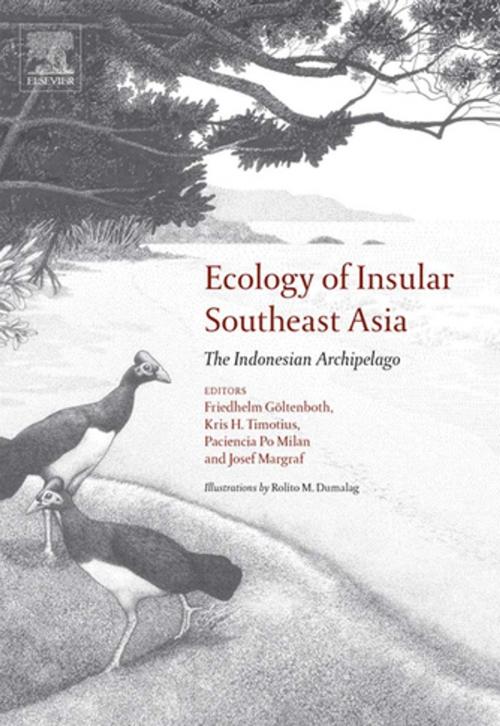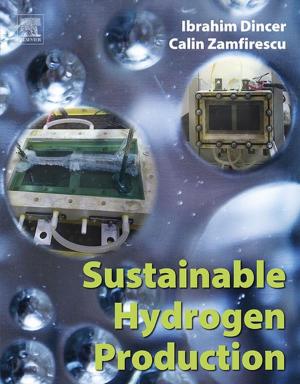Ecology of Insular Southeast Asia
The Indonesian Archipelago
Nonfiction, Science & Nature, Science, Biological Sciences, Ecology, Nature| Author: | ISBN: | 9780080467979 | |
| Publisher: | Elsevier Science | Publication: | December 7, 2006 |
| Imprint: | Elsevier Science | Language: | English |
| Author: | |
| ISBN: | 9780080467979 |
| Publisher: | Elsevier Science |
| Publication: | December 7, 2006 |
| Imprint: | Elsevier Science |
| Language: | English |
The textbook entitled Tropical Ecology of Southeast Asia – The Indonesian Archipelago unfolds in its 5 major chapters with 20 subchapters on more than 500 pages, with more than 300 figures, the basic principles of ecology with examples mainly coming from the Indonesian Archipelago. After an introduction describing the geography, geology and climate of the region, the second chapter is dedicated to marine and freshwater ecosystems. Chapters on the functional ecology of seagrass beds, coral reefs, open ocean and deep sea are followed by information on lotic and lentic freshwater ecosystems. In chapter III ecotones and special ecosystems of the achipelago are in focus. The ecology and ecosystems of shore and tidal flats, mangroves, estuaries and soft bottom shores, caves, small islands, grasslands and savannas are decribed. The forest ecosystems with beach forest, tropical lowland evergreen rainforest, some special forest systems and mountain forests form the contents of chapter IV. The final chapter V is dealing with agroecosystems and human ecology. The main focus in this chapter is ricefield ecology, landuse systems and social ecology, including the advent of man and the development and expansion of man influencing this achipelago. An extended glossary and bibliography is added as well as tables of abbreviations, conversion factors, international system of units and measurements or SI and a geological time table and systematics. The index gives assess to important keywords and relevant information spread thoughout the contents of the book. The textbook will certainly be useful to teachers, lecturers and their students at university and college level. It also gives an overview about insular ecology of the vast Indonesian archipelago to any interested person or working ecologist.
* Focuses on the tropical ecology and insular ecosystems and biodiversity of Indonesia, as well as the agroecology of humid tropics
* Contains over 300 figures
* Provides an extended glossary and bibliography, as well as tables of abbreviations, converstion factors, international system of units and a geological time table
* Easy-to-use index gives access to important keywords used throughout the text
The textbook entitled Tropical Ecology of Southeast Asia – The Indonesian Archipelago unfolds in its 5 major chapters with 20 subchapters on more than 500 pages, with more than 300 figures, the basic principles of ecology with examples mainly coming from the Indonesian Archipelago. After an introduction describing the geography, geology and climate of the region, the second chapter is dedicated to marine and freshwater ecosystems. Chapters on the functional ecology of seagrass beds, coral reefs, open ocean and deep sea are followed by information on lotic and lentic freshwater ecosystems. In chapter III ecotones and special ecosystems of the achipelago are in focus. The ecology and ecosystems of shore and tidal flats, mangroves, estuaries and soft bottom shores, caves, small islands, grasslands and savannas are decribed. The forest ecosystems with beach forest, tropical lowland evergreen rainforest, some special forest systems and mountain forests form the contents of chapter IV. The final chapter V is dealing with agroecosystems and human ecology. The main focus in this chapter is ricefield ecology, landuse systems and social ecology, including the advent of man and the development and expansion of man influencing this achipelago. An extended glossary and bibliography is added as well as tables of abbreviations, conversion factors, international system of units and measurements or SI and a geological time table and systematics. The index gives assess to important keywords and relevant information spread thoughout the contents of the book. The textbook will certainly be useful to teachers, lecturers and their students at university and college level. It also gives an overview about insular ecology of the vast Indonesian archipelago to any interested person or working ecologist.
* Focuses on the tropical ecology and insular ecosystems and biodiversity of Indonesia, as well as the agroecology of humid tropics
* Contains over 300 figures
* Provides an extended glossary and bibliography, as well as tables of abbreviations, converstion factors, international system of units and a geological time table
* Easy-to-use index gives access to important keywords used throughout the text















